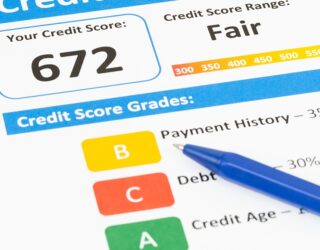Credit Scoring Example
- April 5, 2022
Ever wonder what the reasons are for a change in your credit score?
As a review, it can be helpful to understand what a credit score is and how a credit score is calculated.how a credit score is calculated.
A credit score is a number that shows how trustworthy you are as a borrower. The higher the number, the better. Credit scores are crucial because they affect your ability to borrow money, like getting a loan or a credit card, and they can also influence the interest rates you’ll have to pay.
Several factors go into making up your credit score:
- Payment History (35%): This is like your payment report card. It shows if you pay your bills on time.
- Amounts Owed (30%): This looks at how much money you owe in total and compares it to how much credit you have.
- Length of Credit History (15%): The longer you’ve been responsibly using credit, the better this part looks.
- Types of Credit in Use (10%): Having a mix of different types of credit, like credit cards and loans, can be good for your score.
- New Credit (10%): Opening lots of new credit accounts in a short time can lower your score.
Understanding and managing these factors can help you maintain a good credit score, which, in turn, makes it easier and more affordable to borrow money when you need to.
Credit Score Example
The impact of your financial activity related to credit varies from person to person. A single missed payment will typically have a greater impact on a person with a very high credit scorehigh credit score than for a person with a lower score. While each credit profile is unique, this credit score example should help you understand how late payments or other issues might affect your credit.
From time to time, you may run into financial troubles that impact your score. Some hardships may change your score by a small amount; others can drop your score a lot.
Here is a comparison of the impact that credit problems can have on the scores of two different people. This credit score example can help you understand changes in your credit score. Here’s a snapshot of Jeff and Michelle’s credit profiles:
*Note that their initial FICO scores are 100 points apart.
| Jeff has a score of 680 and: | Michelle has a score of 780 and: |
|---|---|
| Has six credit accounts, including several active credit cards, an active auto loan, a mortgage, and a student loan. | Has 10 credit accounts, including several active credit cards, an active auto loan, a mortgage and a student loan. |
| An eight-year credit history. | A 15 year credit history. |
| Moderate utilization on his credit card accounts (his balances are 40-50% of his limits). | Low utilization on her credit card accounts (her balances are 15-25% of her limits). |
| Two reported delinquencies: a 90-day delinquency two years ago on a credit card account, and an isolated 30-day delinquency on his auto loan a year ago. | Never has missed a payment on any credit obligation. |
| Has no accounts in collections and no adverse public records on file. | Has no adverse public records on file. |

Learn how your credit score is calculated. Talk with Coach Lea here.
Below is an example of how the scores may change based on different scenarios:
| Jeff | Michelle | |
|---|---|---|
| Current FICO Score | 680 | 780 |
| Scores after one of these is added to the credit report: | ||
| Maxing out a credit card | 650-670 | 735-755 |
| A 30-day delinquency | 600-620 | 670-690 |
| Settling a credit card debt | 615-635 | 655-675 |
| Foreclosure | 575-595 | 620-640 |
| Bankruptcy | 530-550 | 540-560 |
As you can see, maxing out a credit card has the smallest impact. Declaring bankruptcy has the biggest impact. For someone like Michelle with a high score of 780, declaring bankruptcy could lower her score by 240 points. One reason is that filing bankruptcy involves more than one credit account.
Notice that Michelle would lose more points for each misstep than would Jeff. That’s because Jeff’s lower score of 680 already reflects his riskier past behavior.
Source of information – www.myfico.com (Credit Education)
Conducting a credit reviewcredit review is a valuable practice for maintaining and enhancing financial health. This process involves assessing your credit report to understand your financial standing.
A credit review is beneficial for several reasons. It allows you to spot any errors or inaccuracies in your credit report that could negatively impact your credit score. By identifying and correcting these issues promptly, you ensure that your credit history accurately reflects your financial behavior. Additionally, a credit review helps you monitor your overall credit health, enabling you to track your progress in building or maintaining a positive credit score.
You can connect with GreenPath for help. Regular reviews empower you to make informed financial decisions, as a good credit score can lead to better loan terms, lower interest rates, and increased financial flexibility. Ultimately, a credit review serves as a proactive step towards a secure and resilient financial future.

Julie Rogier (She/Her)
With a multi-decade career in communications, Julie Rogier serves on GreenPath’s content marketing team. She has presented on financial wellness for groups including the 2021 and 2022 Financial Services Midwest Summit, and regularly writes about financial health and wellness for several publications including U.S. News and World Report.

Client Testimonial
“I was impressed by the kindness and openness of the reps and the fact that they don’t judge me. They’re 100% there to help me. Working with GreenPath has definitely improved my credit score.”

Douglas of Saint Ignace, MI via ConsumerAffairs.com
Free Financial Courses from GreenPath's LearningLab
Free Financial Courses from GreenPath's LearningLab+
GreenPath Counseling Hours
Call 800-550-1961 for immediate help. Or request a call from a counselor at a more convenient time.
Call 877-337-3399 for immediate help. Or request a call from a counselor at a more convenient time.
- Monday-Thursday 8:00 am – 10:00 pm Eastern
- Friday 8:00 am – 8:00 pm Eastern
- Saturday 9:00 am – 6:00 pm Eastern
GreenPath is a non-profit credit counseling organization. GreenPath’s goal is to offer guidance and support to individuals seeking to manage and overcome financial challenges through education, financial counseling and debt management programs. The information provided is for educational purposes only. Consulting with a licensed financial advisor and tax advisor is recommended before making any major financial decisions. GreenPath is not a debt settlement company, credit repair company, credit repair service, nor does GreenPath provide debt consolidation loans. By using this website, you acknowledge and agree that GreenPath is not responsible for any financial decisions you make based on the information provided on this site.
